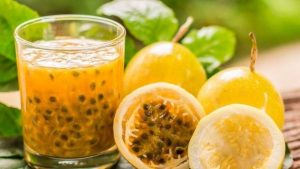The Health Benefits Of Passion Fruit
Passion fruit is a tropical fruit that has sweet-and-sour taste and crunchy, seedy texture. The fruit is gathered from a vine plant, native from South America. Passion fruit has diverse varieties, mostly purple or yellow in color. It can be consumed raw or processed into beverages. Passion fruit contains abundant nutrients, making it a suitable choice for a healthier diet.

Passion fruit nutrition contents per 100 gram
Energy | 406 kJ (97 kcal) | |
Carbohydrates | 22.4 g | |
Sugars | 11.2 g | |
Dietary fiber | 10.4 g | |
Fat | 0.7 g | |
Protein | 2.2 g | |
Vitamins | Quantity | %DV |
Vitamin A equiv. | 64 μg | 8% |
beta-Carotene | 743 μg | 7% |
Riboflavin (B2) | 0.13 mg | 11% |
Niacin (B3) | 1.5 mg | 10% |
Vitamin B6 | 0.1 mg | 8% |
Folate (B9) | 14 μg | 4% |
Choline | 7.6 mg | 2% |
Vitamin C | 30 mg | 36% |
Vitamin K | 0.7 μg | 1% |
Minerals | Quantity | %DV |
Calcium | 12 mg | 1% |
Iron | 1.6 mg | 12% |
Magnesium | 29 mg | 8% |
Phosphorus | 68 mg | 10% |
Potassium | 348 mg | 7% |
Sodium | 28 mg | 2% |
Zinc | 0.1 mg | 1% |
Other constituents | Quantity | |
Water | 72.9 g | |
Rich in dietary fiber
Passion fruit is a good source of dietary fiber. Regular intake of dietary fiber helps to maintain the digestive system and prevents constipation and other gut problems.
Low glycemic index
The passion fruit’s low glycemic index indicates it wouldn’t abruptly increase the blood sugar level. As such, passion fruit is safe to be consumed by people with diabetes or kidney failure.
Improving the imunne system
The contents of vitamin C in passion fruit are beneficial to maintain the immune system. Vitamin C helps the absorption of iron from plant-based food and improves the ability to cope with infection. Another role of vitamin C is as antioxidant, essential to protect the cell from damage caused by free radical molecules.
Maintain the cardiovascular well-being
Passion fruit is rich with riboflavin (vitamin B6) and niacin (vitamin B3). These nutrients provide a wide array of benefits for the cardiovascular system, such as preventing atherosclerosis. Eating the passion fruit with its seed can increase the dietary fiber intake, allowing the removal of excess cholesterol inside the blood vessels. Passion fruit is high-potassium and low-sodium, which maintains the blood pressure around the normal rate and prevents hypertension.
Beneficial for the bone cell
There are a lot of minerals contained in the passion fruit that help maintaining the bone cell. These minerals, such as magnesium, calcium, and phosphorus, are building blocks for a solid bone cell structure. In advance, the said minerals can prevent osteoporosis.

